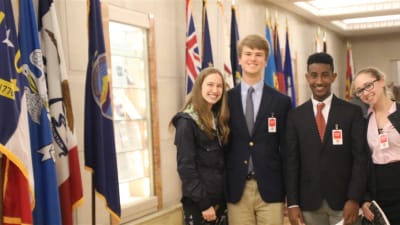Justice, State, and ISIS
Have you ever looked into the eyes of the Assistant Attorney General and defended your ideas on combatting ISIS? What about the eyes of the State Department’s lead expert on counter-violent-extremist communications? Our students did so this week when they presented their capstone policy document at the Departments of State and Justice.
The capstone collaborative policy document is one of SEGL’s most difficult assignments. Each SEGL cohort must select a current international crisis, research that crisis and collaboratively craft a 40-page scholarly document. The students then present and defend the document’s recommendations before real-world policymakers. All in about three weeks while also continuing with regular classes!
This semester chose ISIS and its use of the internet to recruit Americans as its topic. After making this decision, the students split into six groups: History/Current Status, the private sector, the Department of State, the Department of Justice, the intelligence community, and community engagement. The last five of these groups drafted specific recommendations for their area of specialization.
The groups then spent a day in the George Washington University main library, with full access to the University’s resources. David Ettinger (the top international relations/political science research librarian at GW), who has been a student favorite since our first semester, starts with an entertaining orientation session so that the students know how to use the myriad databases in the GW system, and then the students are off to the many corners of the building.
After compiling their research for several days, the students appear before the notorious “Review Panel” (ask a current student or graduate what the unofficial name for this is), a faculty firing line that blisters the students with tough questions designed to ensure their research is consistent, logical, and well-sourced. (This proves especially useful when the students later present to high-ranking officials. This year was particularly useful as two of the officials our faculty portrayed ended up hearing the final student presentations!)
The next step is rough drafts (each read by at least two faculty members), revisions, and additional research. This additional research often includes personal interviews with experts.
And then, before we know it, it is time to present. Each semester we try to meet with on-the-ground policymakers who have the ability to incorporate our students’ ideas into actual policy.
This semester we made two visits. The first was to the Department of Justice to meet with Assistant Attorney General for National Security John Carlin. Carlin is the nation’s top national security attorney and regularly oversees the prosecution of terror suspects (for example, the Boston Marathon bombers). Carlin and a team of three attorneys met the students in a secure conference room (no phones or photos allowed) for over 90 minutes of back-and-forth: half conversation and half law school 101. The students afterwards were exhilarated: to have done enough research to engage in a real conversation about a challenging current issue was no mean feat!
A few days later we walked to the State Department to meet with former Assistant Secretary of Defense and current Director of the Center for Global Engagement Michael Lumpkin. He brought along Irfan Saeed, Director of Countering Violent Extremism at the State Department’s Bureau of Counterterrorism, and together they poked and prodded, helping the students see the needle-in-a-haystack-with-one-arm-behind-your-back challenge of their office’s mission. The discussion was robust and engaging, and the students again left a culminating meeting feeling positive about their accomplishments. The two experiences were a fitting end to such a major assignment.
(We wish we could report details (and share pictures) of each meeting, but of course both were off-the-record. Check with one of our students to get more information!)
Want to see the document for yourself? You can download it here.
We’ve also included a few pictures from the all-Greek meal that two students made last weekend in honor of Greek Orthodox Easter. (Earlier this semester, we had a student-organized Seder, too.) The food and student spirit were both excellent!
Next week: executive power and our culminating crisis simulation.









